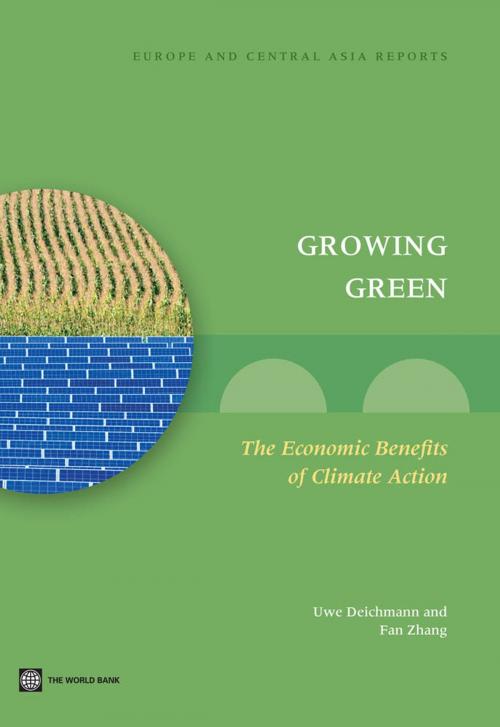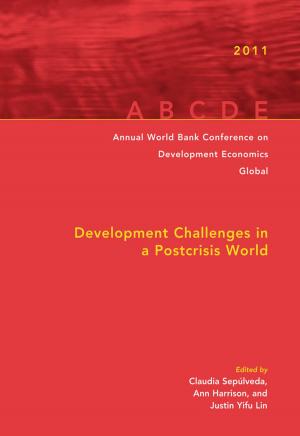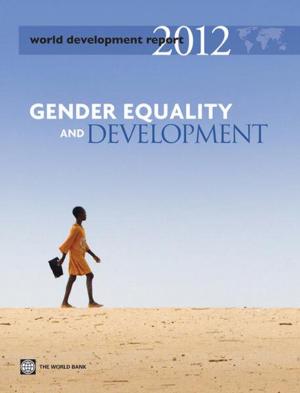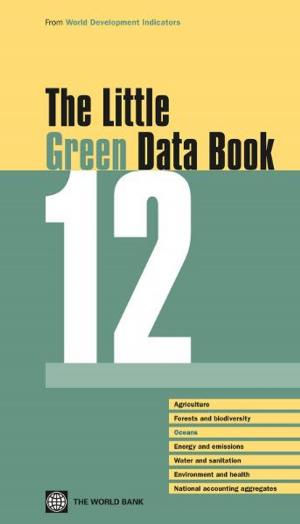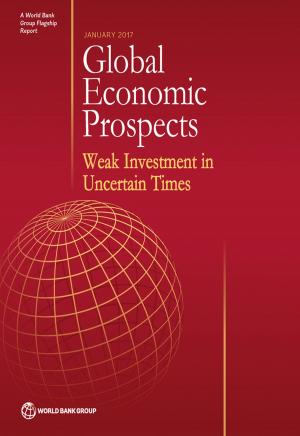Growing Green
The Economic Benefits of Climate Action
Nonfiction, Social & Cultural Studies, Political Science, Politics, Regional Planning, Government, Social Policy, Public Policy| Author: | Uwe Deichmann, Fan Zhang | ISBN: | 9780821397923 |
| Publisher: | World Bank Publications | Publication: | April 22, 2013 |
| Imprint: | Language: | English |
| Author: | Uwe Deichmann, Fan Zhang |
| ISBN: | 9780821397923 |
| Publisher: | World Bank Publications |
| Publication: | April 22, 2013 |
| Imprint: | |
| Language: | English |
Pollution from fossil fuels and degraded natural lands are raising the earth’s temperature. The evidence of the causes of global warming is clear, as are its consequences. The economic impacts of climate change are already apparent and they threaten development gains. Extreme weather events have brought severe droughts to Central Asia, heat waves and forest fires to Russia, and floods to Southeastern Europe. Unchecked emissions will come at rising economic cost and increasing risk to individuals. There is a clear case for all of the world’s economies to move to a low-carbon growth path. Yet, climate action has been inadequate, especially in Eastern Europe and Central Asia (ECA). With prospects of a global climate agreement uncertain, this report identifies the actions that governments in the region can take to reduce the carbon footprints of their economies. It shows that many of these actions will more than pay for themselves—and quite quickly when indirect benefits such as better health and increased competitiveness are considered. To realize these benefits, policy makers in ECA need to quickly move on three sets of priorities: use energy much more efficiently, gradually move to cleaner energy sources, and increase carbon capture in soils and forests. This will require transformations in power generation, industrial production, mobility, city living, and in farming and forestry. Policy makers are justifiably worried that climate action may jeopardize economic performance and strain the budgets of poorer families. The report shows how well-designed growth and social policies can make climate action growth-enhancing while protecting the living standards of less-well-off households.
Pollution from fossil fuels and degraded natural lands are raising the earth’s temperature. The evidence of the causes of global warming is clear, as are its consequences. The economic impacts of climate change are already apparent and they threaten development gains. Extreme weather events have brought severe droughts to Central Asia, heat waves and forest fires to Russia, and floods to Southeastern Europe. Unchecked emissions will come at rising economic cost and increasing risk to individuals. There is a clear case for all of the world’s economies to move to a low-carbon growth path. Yet, climate action has been inadequate, especially in Eastern Europe and Central Asia (ECA). With prospects of a global climate agreement uncertain, this report identifies the actions that governments in the region can take to reduce the carbon footprints of their economies. It shows that many of these actions will more than pay for themselves—and quite quickly when indirect benefits such as better health and increased competitiveness are considered. To realize these benefits, policy makers in ECA need to quickly move on three sets of priorities: use energy much more efficiently, gradually move to cleaner energy sources, and increase carbon capture in soils and forests. This will require transformations in power generation, industrial production, mobility, city living, and in farming and forestry. Policy makers are justifiably worried that climate action may jeopardize economic performance and strain the budgets of poorer families. The report shows how well-designed growth and social policies can make climate action growth-enhancing while protecting the living standards of less-well-off households.
